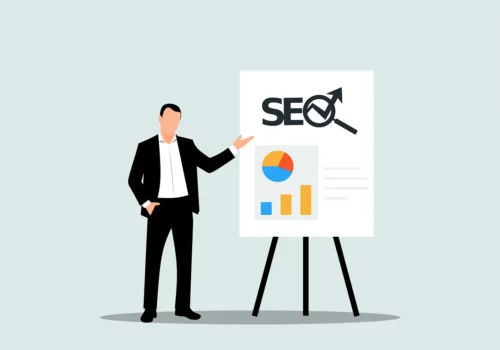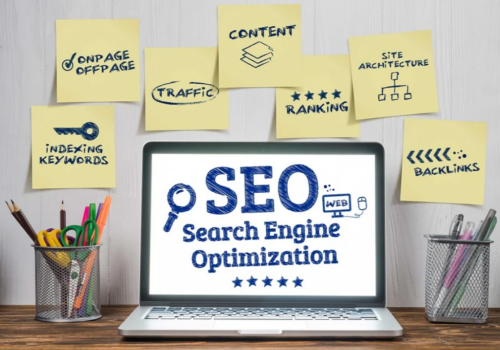Hey there! Ready to dive into the exciting world of SEO and PPC? Getting to know the differences between these two marketing strategies will help you decide which would be better for your business.
Let’s talk numbers for a moment. Did you know that SEO drives about 70-80% of organic traffic, while PPC captures around 15-25% of clicks?
That’s right! SEO is like a marathon runner, steadily building your online presence over time, while PPC is the sprinter, delivering instant results when you need a quick boost.
Both have their strengths and can work wonders for your business, depending on your goals and budget.
But fear not! I’m here to guide you through the decision-making process. So sit back, relax, and get ready to discover whether SEO or PPC will take your business to new heights.
Let’s embark on this digital adventure together and find the perfect marketing strategy that suits your needs and brings you that sweet online success!
Now that we’ve set the stage, let’s dig deeper into the world of SEO and PPC and uncover their unique features, benefits, and which one may be the right fit for your business.
Get ready to make some informed decisions and level up your marketing game with my in-depth guide on SEO VS PPC.
SEO VS PPC In A Glance
SEO, which stands for Search Engine Optimization, is like the master of organic search. It’s all about getting your website to rank higher in search engine results without having to pay for each click.
Think of it as the long-term game, where you optimize your website’s content, structure, and keywords to attract valuable traffic from search engines like Google.
And trust me, when you start appearing on that coveted first page of search results, it’s like winning a gold medal in the digital Olympics!
On the other hand, we have PPC, also known as Pay-Per-Click marketing. This strategy is like the rockstar of paid search, social media, and display advertising.
With PPC, you pay for each click on your ads, allowing you to instantly drive targeted traffic to your website. It’s like having a magic wand that brings people straight to your virtual doorstep.
Plus, you can also flex your creative muscles by designing eye-catching ads that grab attention and convert like crazy.
Here’s a table highlighting the major differences between SEO and PPC:
| SEO (Search Engine Optimization) | PPC (Pay-Per-Click) Marketing |
| Focuses on organic search | Focuses on paid search, social, and display |
| Long-term strategy | Immediate results |
| Requires ongoing optimization and content creation | Requires continuous monitoring and management of campaigns |
| Rankings depend on various factors like website quality, content relevance, and backlinks | Ad positions depend on bidding, quality score, and ad relevance |
| Cost-effective in the long run | Cost can vary based on the competitiveness of keywords and bidding strategy |
| Traffic may take time to build | Immediate traffic generation |
| Can generate higher click-through rates and organic credibility | Offers precise targeting and control over the audience |
| Results may take time to measure and analyze | Real-time performance tracking and data available |
| Requires technical and content optimization knowledge | Requires ad copywriting and campaign management skills |
| Can attract long-term, sustainable traffic | Offers flexibility to scale campaigns up or down |
What Is SEO?
Search engine optimization is also known as SEO. SEO was born in 1991 when the world’s first website was launched. At this time, there was a huge need for structure and accessibility, and the world’s first search engines were created.
Search engine results pages (SERPs), refer to improving the visibility and rankings of websites. The goal of SEO is to attract organic (non-paid) traffic from search engines by making the website more relevant and valuable to users.
This involves various techniques such as keyword research, on-page optimization, off-page link building, and technical improvements to enhance the website’s performance.
By implementing effective SEO strategies, businesses can increase their online visibility, reach their target audience, and drive more organic traffic to their website, ultimately leading to higher conversions and business growth.
As a digital marketing expert, let me explain the four areas of SEO in simpler terms and provide examples:
- Keyword Research: This involves understanding the words and phrases that people use when searching on search engines. For instance, let’s say you have an online store that sells coffee products. To find relevant keywords, you can brainstorm terms like “coffee beans,” “coffee accessories,” or “best coffee brands.” Using a keyword research tool you can get insights into search volumes and discover related terms that your target customers are searching for.
- On-Page SEO: This focuses on creating content that matches what searchers are looking for. It’s important to understand the search intent behind a query. For example, if someone searches for “how to make kefir,” they are looking for a tutorial or step-by-step guide. So, if you have a blog post or video providing instructions on making kefir, it’s essential to optimize your content with relevant keywords, a compelling title, and descriptive URLs. This way, search engines can better understand and rank your content for the intended audience.
- Off-Page SEO: This involves activities done outside of your website to demonstrate its credibility to search engines. A crucial aspect of off-page SEO is building quality backlinks from reputable websites. Backlinks demonstrate the trustworthiness and value of your content to search engines. For instance, if a well-known coffee blog links to your online store’s coffee products, it signals to search engines that your website is a reliable source for coffee-related information. Additionally, factors like positive customer reviews, business citations, and social media mentions also contribute to off-page SEO.
- Technical SEO: This aspect ensures that search engines can effectively crawl, index, and understand your website’s content. Technical SEO involves optimizing factors like website speed, mobile responsiveness, site architecture, and proper URL structure. For example, if your website takes a long time to load, search engines may penalize its rankings. Similarly, if your website isn’t mobile-friendly, it may not rank well for users searching on mobile devices. By addressing technical SEO issues, you improve the chances of your website being discovered and ranked by search engines.
What Is PPC?
PPC (Pay-Per-Click) is an online advertising model where advertisers pay a fee each time their ad is clicked. It is commonly used in search engine advertising, such as Google Ads, as well as social media platforms.
Here’s a breakdown of the key components of PPC advertising:
- Keyword Research: Similar to SEO, keyword research is crucial in PPC. Advertisers must identify relevant keywords that their target audience is likely to search for. For instance, a travel agency may choose keywords like “cheap flights” or “vacation packages” to reach potential customers. Example: A company selling running shoes might conduct keyword research and select terms like “best running shoes,” “athletic footwear,” or “sports sneakers” to target potential buyers searching for such products.
- Bid Setting: Advertisers need to set bids to determine the maximum amount they are willing to pay for each click on their ads. The bidding process involves competition with other advertisers targeting the same keywords. Higher bids increase the chances of ad visibility but can also lead to higher costs. Example: In a competitive market like online fashion retail, advertisers bidding on popular keywords such as “fashion trends” or “designer clothing” may need to set higher bids to secure ad placements.
- Ad Creation: Advertisers create compelling ad copy and decide on the landing page where users will be directed after clicking the ad. Ad content should be relevant, engaging, and persuasive to attract clicks and drive conversions. Example: An e-commerce store specializing in outdoor equipment may create an ad with the headline “Gear Up for Your Next Adventure” and provide a direct link to their camping gear category page.
- Audience Targeting: PPC platforms allow advertisers to define their target audience based on various parameters like demographics, interests, locations, and behaviors. This ensures ads are shown to users who are more likely to be interested in the products or services offered. Example: A fitness center may target its PPC ads to individuals within a specific radius of their location, ensuring they reach potential customers who are geographically close and more likely to visit.
By understanding these aspects of PPC advertising, businesses can strategically reach their target audience, drive relevant traffic, and increase the likelihood of achieving their marketing goals.
SEO vs PPC: Which Is Better?
When it comes to choosing between SEO and PPC, the decision should be based on your specific goals and circumstances. Let’s explore some scenarios where one channel may be more advantageous than the other, along with relevant examples:
1. Innovative Product:
If you’re introducing a groundbreaking product that people aren’t actively searching for yet, relying solely on SEO may not yield immediate results.
For instance, let’s say you’ve created a futuristic virtual reality headset. Since there may not be existing search demand for it, running PPC ads on social media platforms like Facebook or Instagram can help generate awareness and reach your target audience.
2. Limited-time offer or product launch:
Suppose you’re launching a limited-time discount or promoting a new product. SEO takes time to build momentum, so using PPC can provide immediate visibility and drive targeted traffic to your landing pages.
For example, if you’re offering a special Black Friday deal on your e-commerce website, running PPC campaigns on Google Ads can quickly attract potential customers searching for relevant keywords like “Black Friday deals.”
3. Informational keywords or top-of-the-funnel content:
Some keywords are more informational rather than transactional. Let’s say you run a fitness blog and want to rank for “benefits of yoga.”
While running PPC ads for such queries may not lead to direct conversions, focusing on SEO by creating comprehensive blog posts or video tutorials can attract organic traffic over time.
This allows you to build trust and establish your brand as an authoritative source in the fitness industry.
4. Promoting commercial content:
PPC is particularly effective for promoting commercial content like product pages or landing pages. Suppose you’re launching a new line of running shoes on your e-commerce website.
Running targeted PPC ads on search engines like Google can help you quickly capture the attention of potential customers actively searching for running shoes.
By optimizing your ads with compelling copy and relevant keywords, you can drive qualified traffic directly to your product pages.
5. Limited budget:
If you have a tight budget, investing in SEO can be a cost-effective approach to driving organic traffic. Let’s say you run a small local bakery and want to attract more customers to your website.
By optimizing your website for local SEO, creating engaging blog posts about baking tips, and getting backlinks from local directories, you can increase your organic visibility without spending on PPC ads.
6. Website flipping:
If you’re involved in buying and selling websites, having a strong SEO foundation can significantly enhance the value of the site.
Suppose you’ve built a niche website about sustainable living with high organic traffic from ranking well for eco-friendly product reviews and guides.
Buyers would perceive this site as more valuable compared to one relying heavily on PPC ads, as organic traffic is more stable and sustainable in the long run.
Ultimately, the choice between SEO and PPC depends on your specific goals, target audience, and available resources.
It’s important to evaluate the unique characteristics of your business and choose the approach that aligns best with your objectives to maximize your online visibility and drive meaningful results.
SEO And PPC: The Best Of Both Worlds
As a digital marketer, I believe that utilizing both SEO and PPC can bring significant benefits to businesses. They can work hand in hand to maximize visibility and drive targeted traffic. Here’s how I personally use them together:
1. Using PPC ads to promote content:
When I create valuable content, such as in-depth guides or informative blog posts, I leverage PPC ads to ensure it reaches a wider audience.
For instance, I run Facebook ads, Twitter ads, and Quora ads to distribute the content to interested individuals. Additionally, I utilize YouTube ads to promote my YouTube videos.
By running targeted PPC campaigns, I can drive more traffic and increase the exposure of my content.
2. Implementing retargeting strategies:
Retargeting is a powerful technique that allows me to reconnect with visitors who have previously engaged with my website.
By placing a cookie on their browser, I can display ads specifically tailored to them as they browse the web. This presents an opportunity to entice them to return and reconsider their initial interest, whether it’s through offering a free resource, a trial, or a product.
While I prioritize user privacy and don’t personally use retargeting, it can be a valuable strategy for businesses.
3. Capitalizing on competitor keywords:
To gain a competitive edge, I conduct research on the keywords my competitors are bidding on in Google Ads.
Using tools like Ahrefs’ Site Explorer, I can identify the keywords they’re targeting, the landing pages they direct traffic to, and even the ad copy they employ.
By analyzing this data, I can discover lucrative keywords that align with my business goals and determine whether to pursue them through PPC campaigns or optimize my website’s content for SEO.
For example, if you run a fitness apparel brand and find that a competitor is bidding on keywords like “best workout leggings,” you can consider targeting the same keywords through PPC ads to capture potential customers’ attention.
Simultaneously, you would also optimize my website’s content to rank organically for those keywords, leveraging the power of SEO.
By utilizing both SEO and PPC in a coordinated manner, businesses can enhance their online presence, attract more qualified leads, and drive conversions.
It’s important to analyze your specific goals, target audience, and resources to determine the best approach and strike a balance between these two valuable marketing channels.
Quick Links:
- What Does SEO Mean: Basics Explained!
- What Does ChatGPT Do? ChatGPT For Content And SEO?
- The Definitive Guide to E-commerce SEO
- What Are SEO Services: What Do SEO Company Services Include?
Final Thoughts: SEO vs PPC 2024
In my opinion, the combination of SEO and PPC is a winning strategy for businesses aiming to dominate the online landscape.
While SEO lays the foundation for long-term organic visibility and credibility, PPC provides instant visibility and targeted reach.
Together, they create a powerful synergy that can drive significant traffic, conversions, and business growth. So, why settle for one when you can have the best of both worlds?
Embrace the power of SEO and PPC to unlock the full potential of your online presence. Cheers to a successful digital marketing journey!












The article provides a comprehensive and informative overview of the key differences between SEO and PPC, offering valuable insights for businesses looking to enhance their online marketing strategies. It effectively explains the pros and cons of each approach, helping readers make informed decisions based on their specific goals and resources.